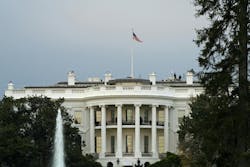US imposes new Iran oil sanctions targeting exports to China
The US imposed new sanctions on Iran’s oil sector as part of the $95-billion foreign aid package passed by the House and Senate and signed by President Biden on Apr. 24.
The sanctions aim to reduce Iran’s oil trade with China, which has grown in the past year. The broadened sanctions target Chinese banks that conduct transactions involving Iranian crude and products.
They also now include foreign refineries, vessels, and ports that knowingly process, transfer, or ship crude oil in violation of existing sanctions. Ships that violate the ban would be barred from US ports for 2 years.
The new law requires the Biden administration to conduct an annual assessment of Iran’s oil exports.
Iran produces about 3 million b/d and is expected to increase output by a further 280,000 b/d this year, according to the International Energy Agency's March 2024 Oil Market Report (OGJ Online, Mar 14, 2024).
Most of Tehran’s oil exports of about 1.3-1.6 million b/d are flowing to China, the Congressional Research Service (CRS) said in a Feb. 28 report.
Exact production and export figures are hard to verify because the “evasive techniques used to obscure Iranian petroleum exports complicate efforts to identify Iran’s trade patterns and use sanctions effectively in furtherance of US foreign policy,” CRS noted.
“With China’s increasing imports of Iranian petroleum, Chinese buyers may have concluded that the economic benefits of continuing to buy Iranian petroleum exceed the risks of potential US sanctions,” the agency continued.
CRS explained that Iranian petroleum is often sold below prevailing market prices and most reported Chinese buyers of Iranian petroleum are small, semi-independent refineries known as “teapots” that are “hard to uncover and not exposed to the US financial system, constraining the effect of US sanctions.”
Oil price
Kevin Book, an analyst at Washington-based consultant ClearView Energy, told Oil & Gas Journal that he estimates about 40% of the Iranian oil moving to China is “effectively unsanctionable” under the existing sanctions regime. But if the US were to “explicitly enforce” new and existing sanctions, it might stop the remaining 750,000-800,000 b/d by going after some of the intermediary targets, Book said.
If the full 60% of Iranian crude were taken off the market, world crude oil prices could rise about $8.40/barrel, he said. Book acknowledged, however, that the US would face difficulties tracking, sanctioning, and stopping the entire amount.
Included are 180-day waivers that President Biden could use to avert oil price spikes that he seeks to avoid ahead of the November presidential election.
The anticipated price impact drops to zero if President Biden uses his discretionary waiver authority to avoid enforcing sanctions. “Waivers could nullify the impact,” Book said.
Biden has taken actions over his presidency to contain US gasoline prices, but it does not necessarily mean he would use the authority to waive sanctions, Book said. “It could be very difficult politically for Biden to exercise the waivers,” especially if Iran continues attacks on Israel.
On the other hand, if the situation becomes “more under control” in the Middle East, Biden could continue sanctions leniency on Iran to moderate prices.
The foreign aid package also includes aid for Ukraine, Israel, and Taiwan, and a requirement that the Chinese-owned parent company of social media giant TikTok sell the company within a year.
About the Author
Cathy Landry
Washington Correspondent
Cathy Landry has worked over 20 years as a journalist, including 17 years as an energy reporter with Platts News Service (now S&P Global) in Washington and London.
She has served as a wire-service reporter, general news and sports reporter for local newspapers and a feature writer for association and company publications.
Cathy has deep public policy experience, having worked 15 years in Washington energy circles.
She earned a master’s degree in government from The Johns Hopkins University and studied newspaper journalism and psychology at Syracuse University.
